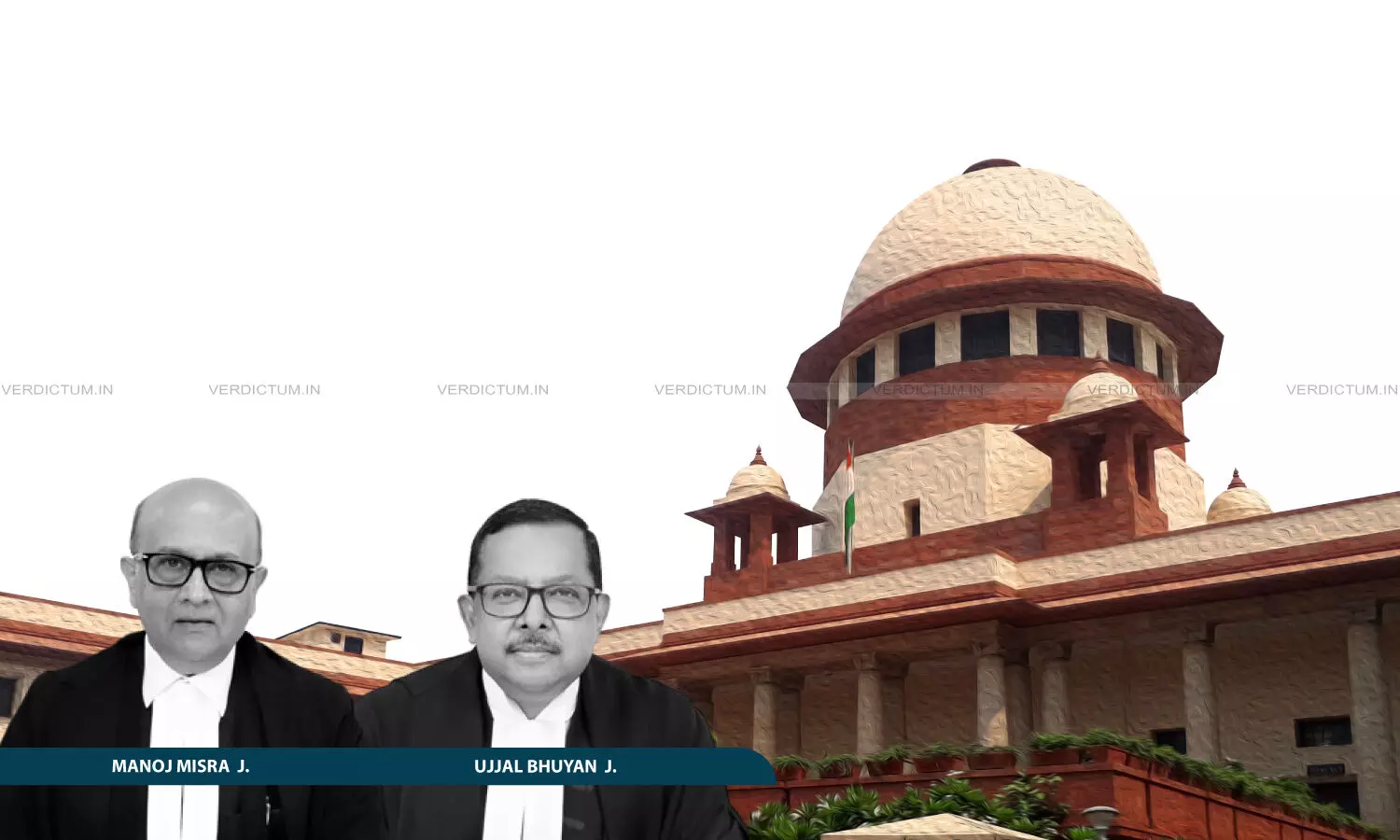
Justice Manoj Misra, Justice Ujjal Bhuyan, Supreme Court
If Motor Vehicle Is Not Used Or Kept For Use In "Public Place", Owner Can’t Be Burdened With Motor Vehicle Tax: Supreme Court
 |
|The appeal before the Supreme Court arose from an order of the Andhra Pradesh High Court.
While upholding an order directing the refund of taxes paid under protest, the Supreme Court has held that if a motor vehicle is not used in a ‘public place’ or not kept for use in a ‘public place’ then the person concerned is not deriving benefit from the public infrastructure and he should not be burdened with the motor vehicle tax for such period.
The appeal before the Apex Court arose from an order of the Andhra Pradesh High Court and in the context of Section 3 of the Andhra Pradesh Motor Vehicle Taxation Act, 1963
The Division Bench of Justice Manoj Misra and Justice Ujjal Bhuyan held, “Motor vehicle tax is compensatory in nature. It has a direct nexus with the end use. The rationale for levy of motor vehicle tax is that a person who is using public infrastructure, such as, roads, highways etc. has to pay for such usage. Legislature has consciously used the expression ‘public place’ in Section 3. If a motor vehicle is not used in a ‘public place’ or not kept for use in a ‘public place’ then the person concerned is not deriving benefit from the public infrastructure; therefore, he should not be burdened with the motor vehicle tax for such period.”
Factual Background
The Appellant Company, owning various motor vehicles used as heavy lifting equipments and engaged in the business of providing logistic support was awarded a contract for handling and storage of iron and steel materials at the central dispatch yard within Visakhapatnam Steel Plant, Andhra Pradesh, a corporate entity of Rashtriya Ispat Nigam Limited (RINL). The Appellant wrote to the Transport Department intimating that the motor vehicles of the appellant used in the central dispatch yard premises belonging to Visakhapatnam Steel Plant of RINL were not being used on public roads and, therefore, requested for exemption from payment of motor vehicle tax for the period the vehicles were confined and used within the central dispatch yard premises. This prayer was made in terms of Section 3 of The Andhra Pradesh Motor Vehicle Taxation Act, 1963 ( A.P. Act, 1963).
The Motor Vehicle Inspector inspected the motor vehicles stationed in the central dispatch yard premises and raised a demand of Rs 7,37,960 against such motor vehicles. In addition, a further demand of Rs 15,33,740 was raised. The Appellant paid Rs 22,71,700.00. The High Court directed the respondents to consider the prayer of the appellant for the grant of exemption from payment of motor vehicle tax. After the Authority rejected the appellant’s prayer, a Single Judge Bench of the High Court directed the respondents to refund the amount of Rs 22,71,700 to the appellant. However, this order was set aside by a Division Bench. It was in such circumstances that the appeal came to be filed before the Apex Court.
Reasoning
The Bench explained that the taxable event under Section 3 is when a vehicle is used or kept for use in a ‘public place’ in the State. Therefore, the tax is on the user or intended for the use of a motor vehicle in a ‘public place’. As per the Bench, if a vehicle is actually used in a ‘public place’ or kept in such a way that it is intended to be used in a ‘public place’, then the tax liability accrues.
The Bench was of the view that the purpose of Rule 12A of the Andhra Pradesh Motor Vehicles Taxation Rules, 1963 is to give effect to Section 3. “It is trite law that a rule cannot traverse beyond the scope and 46 ambit of the parent statute. Rule 12A has to be interpreted in such a way so as to be in sync with Section 3”, it stated.
As per the Bench, when the motor vehicles of the appellant were confined for use within the RINL premises, which is a closed area, then the question of the vehicles being used or kept for being used in a ‘public place’ does not arise. “In the ultimate analysis, the core of the controversy lies in interpretation of Section 3. Rule 12A, as already discussed above, has to be read to give effect to the charging section. Therefore, the words appearing in Rule 12A i.e. ‘a motor vehicle shall be deemed to be kept for use’ has to be read as ‘a motor vehicle deemed to be kept for use in a public place’.”, it held.
“In the instant case, the motor vehicles in question were used or kept for use only within the restricted premises of RINL which is not a ‘public place’. Therefore, the said vehicles are not liable to be taxed for the period the said vehicles were used or kept for use within the restricted premises of RINL. Argument of the respondent that appellant had not intimated non-use of the motor vehicles in terms of Rule 12A does not carry much persuasion in view of what we have discussed supra. Thus, even in the absence of any intimation in terms of Rule 12A, motor vehicles of the appellant cannot be subjected to motor vehicle tax for the period those were used or kept confined within the restricted premises of RINL”, it said.
Thus, in view of such facts and circumstances, the Bench set aside the judgment of the Division Bench of the High Court and allowed the appeal.
Cause Title: M/s. Tarachand Logistic Solutions Limited v. State of Andhra Pradesh (Neutral Citation: 2025 INSC 1052)